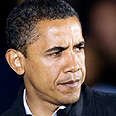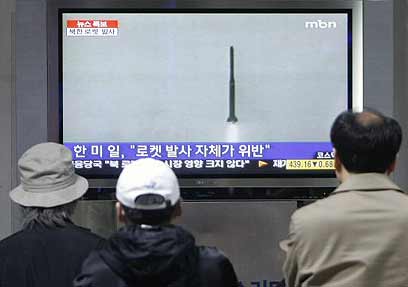
Analyst: Pyongyang is Obama's pretest for Tehran
Prof. Eytan Gilboa says US president faces first test of leadership as world waits for Washington's reaction to N. Korea's brazen missile launch. 'If he fails to act now, he can forget about acting against Iran,' he says
North Korea's missile launch was meant to threaten US President Barack Obama and show him that Pyongyang is undeterred by the prospect of international sanctions, Prof. Eytan Gilboa of Bar-Ilan University told Ynet on Sunday.
North Korea launched a long-range rocket over Japan early Sunday, drawing swift international condemnation and triggering an emergency meeting of the UN Security Council. State-run Korean television later reported that the Kwangmyongsong-2 satellite was successfully circling in orbit.
Gilboa, a member of Bar-Ilan's Program on Conflict Management and Negotiation, deemed the launch a feat for Pyongyang and a test for Obama, adding that the key to neutralizing the tensions with North Korea lies with China, since Beijing is the only regional force capable of exercise any leverage on its wayward neighbor.
"We can expect Obama's reaction on Wednesday, when he meets with Chinese President Hu Jintao in Washington. If Beijing chooses to do nothing it risks a strong disagreement with Washington, and therefore Obama's first test of leadership will be the nature of the measures he will able to convince China to use against North Korea
"I'm sure he will pressure China to take certain steps, as well as demand certain explanations regarding Iran."
While the US administration's response to Pyongyang's move is still pending, Beijing's reaction was moderate, as Foreign Ministry Spokeswoman Jiang Yu called on all sides "to keep calm, exercise restraint and cooperate in order to keep the peace in the region."
Tehran via Pyongyang
The international community is well aware of the fact that the way the Obama administration will choose to deal with North Korea will undoubtedly set the tone for its future dealings with Iran.
Both nations are in strife with the West over their nuclear ambitions, but unlike Iran, North Korea is a self-proclaimed nuclear power which has held atomic weapons tests. Pyongyang eventually yielded to the international community's demand to disarm, but so far has failed to do so.
Both the Islamic Republic and the Far East power have also refused to obey Security Council orders concerning their various military activities – Iran by refusing to shut down its nuclear program and North Korea by refusing to cease its ballistic missile testing.

A brazen move. The launch (Photo: Reuters)
"The world wants to stop both nations from getting nuclear weapons," said Gilboa. "This will be a test of Obama's ability to translates his statements into actions and demonstrate the principle of international cooperation. If he fails to act against North Korea now, he can forget about acting against Tehran. The entire world is watching and waiting."
If the American president succeeds in ensuring a biting Security Council resolution against Pyongyang – one which will include harsh sanctions – he would be sending an important message, added Gilboa.
"He has to mass a firm coalition on the matter among the UN nations tasked with dealing with the North Korean nuclear program, namely China, Japan, Russia and South Korea."
Ironically, the Kwangmyongsong-2 satellite was launched into orbit just hours before Obama was to make a speech about the need for nuclear disarmament.
North Korea agreed to disarm in 2007, in exchange for vast diplomatic and financial incentive, but the communist nation has failed to hold up its end of the deal. Furthermore, its involvement in building the suspected nuclear reactor in Syria, bombed by Israel in late 2007, indicates it is still a threat, weapons distribution wise.
"Obama was called to deal with this crisis after a successful European visit," concluded Gilboa. "He demonstrated leadership and made valid demands on the financial crisis and the Afghanistan fronts, but NATO and the G-20 are here comfort zones, while Iran and North Korea are foreign, dangerous ones."
Reuters and AP contributed to this report










